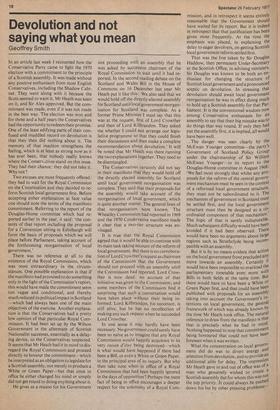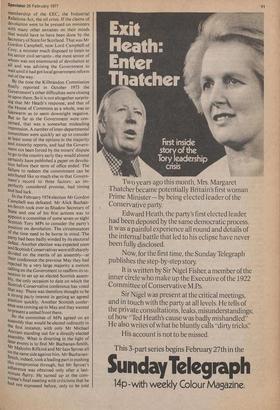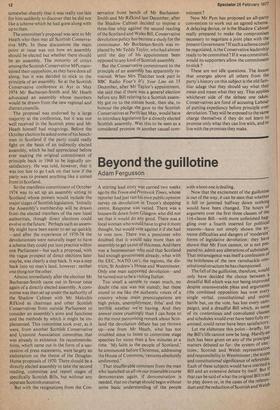Devolution and not saying what you mean
Geoffrey Smith In an article last week I recounted how the Conservative Party came to fight the 1970 election with a commitment to the principle of a Scottish assembly. It was made without any positive enthusiasm from most English Conservatives, including the Shadow Cabinet. They went along with it because the Scots seemed to want it, Mr Heath was keen on it, and Sir Alex approved. But the commitment was made, even if it was not made in the best way. The election was won and for three and a half years the Conservatives had the opportunity to redeem their promise. One of the least edifying parts of their confused and muddled record on devolution is that they then did nothing about it. The memory of that inaction strengthens the feeling, which is at least as strong now as it has ever been, that nobody really knows where the Consen,..itives stand on this issue. They had their chance: they did not take it. Why not ?
Two excuses are most frequently offered: they had to wait for the Royal Commission on the Constitution and they decided to reform Scottish local government first. Before accepting either explanation at face value one should note the terms of the manifesto commitment. Referring to the report of the Douglas-Home committee which had reported earlier in the year, it said : 'the contents of that report including the proposal for a Convention sitting in Edinburgh will form the basis of proposals which we will place before Parliament, taking account of the forthcoming reorganisation of local government.'
There was no reference at all to the existence of the Royal Commission, which was most extraordinary in the circumstances. One possible explanation is that if the manifesto had promised to do something only in the light of the Commission's report, this would have made the commitment seem too vague and conditional, and thereby much reduced its political impact in Scotland —which had always been one of the main objectives of the exercise. Another explanation is that the Conservatives had a pretty low opinion of that particular Royal Commission. It had been set up by the Wilson Government in the aftermath of Scottish Nationalist successes, essentially as a delaying device, so the Conservatives suspected. It seems that Mr Heath had it in mind to disregard the Royal Commission and proceed directly to honour the commitment—which he interpreted as an obligation to legislate for a Scottish assembly, not merely to produce a White or Green Paper—but that once in office he either changed his mind or simply did not get round to doing anything about it.
He gives as a reason for his Government not proceeding with an assembly that he was asked by successive chairmen of the Royal Commission to wait until it had reported. In the second reading debate on the Scotland and Wales Bill in the House of Commons on 16 December last year Mr Heath put it like this: We also said that we would hold off the directly-elected assembly for Scotland until local government reorganisation for Scotland was complete. As a former Prime Minister I must say that this was at the request, first of Lord Crowther and then of Lord Kilbrandon. They asked me whether I could not arrange our legislative programme so that they could finish their discussions and then make a complete recommendation about devolution.' It will be noted that Mr Heath was there running the two explanations together. They need to be disentangled.
The Conservatives certainly did not say in their manifesto that they would hold off the directly elected assembly for Scotland until local government reorganisation was complete. They said that their proposals for the assembly would take account of the reorganisation of local government, which is quite another matter. The general lines of that reorganisation were known. The Wheatley Commission had reported in 1969 and the 1970 Consbrvative manifesto made it clear that a two-tier structure was envisaged.
It is true that the Royal Commission agreed that it would be able to continue with its main task taking account of the reform of local government. But there is no corroboration of Lord Crowther's request as chairman of the Commission that the Government should not proceed with, an assembly until the Commission had reported. Lord Crowther is now dead : no account of that initiative was given to the Commission; and some members of the Commission find it surprising that such a conversation would have taken place without their being informed. Lord Kilbrandon, his successor, is still alive, but he has no recollection of making any such request when he succeeded Lord Crowther.
In one sense it may hardly have been necessary. No government could surely have been so naïve as to imagine that any Royal Commission would happily acquiesce in its very raison d'être being destroyed—which is what would have happened if there had been a Bill, or even a White or Green Paper, in the principal area of its inquiry. But why then take note when in office of a Royal Commission that had been happily ignored in the days of opposition ? Perhaps the mere fact of being in office encourages a deeper respect for the solemnity of a Royal Com
mission, and in retrospect it seems entirely reasonable that the Government should have waited for its report. But it is indeed in retrospect that that justification has been given most frequently. At the time the emphasis was placed, in explaining the delay to eager devolvers, on getting Scottish local government reform settled first.
That was the line taken by Sir Douglas Haddow, then permanent Under-Secretary at the Scottish Office, in advising ministers. Sir Douglas was known to be both an enthusiast for changing the structure of Scottish local government and a pronounced sceptic on devolution. In stressing that devolution should await local government reorganisation he was in effect doing much to hold up a Scottish assembly for that Parliament. It is the conventional wisdom now among Conservative enthusiasts for an assembly to say that their big mistake was t° do things that way round. If only they had put the assembly first, it is implied, all would have been well.
,The danger was seen clearly by the McEwan Younger committee—the party's Government of Scotland Policy Grow, under the chairmanship of Sir William McEwan Younger—in its report to the Douglas-Home committee in August 1968: 'We feel most strongly that whilst any proposals for the reform of the central government mechanism must be seen in the context of a reformed local government structure, they must not be subordinated to it. The mechanism of government in Scotland must be settled first, and the local government structure must then be designed as a ea: ordinated component of that mechanism. The logic of that is surely indisputable. Much subsequent difficulty would have been avoided if it had been observed. There would have been no arguments about large regions such as Strathclyde being incompatible with an assembly. But it is by no means evident that action on the local government front precluded anY move towards an assembly. Certainly it would have been impossible to overload the parliamentary timetable even more with Bills in both fields at the same time. But there would have to have been a White or Green Paper first, and that could have been published with proposals for an assembly taking into account the Government's intentions on local government, the general framework of which was already known bY the time Mr Heath took office. The natural inference to draw from the manifesto is that that is precisely what he had in minaNothing happened to stop that commitment being honoured that could not have been foreseen when it was written.
What the concentration on local government did do was to divert energy and attention from devolution, and to provide an additional alibi for delay. The impression Mr Heath gave in and out of office was of a man who genuinely wished to create a Scottish assembly but for whom this wasnot. the top priority. It could always be pushea down his list by other pressing problems
membership of the EEC, the Industrial Relations-Act, the oil crisis. If the claims of devolution were to be pressed on ministers With many other anxieties on their minds that would have to have been done by the Secretary of State for Scotland. That was Mr Gordon Campbell, now Lord Campbell of Croy, a minister much disposed to listen to his senior civil servants—the most senior of Whom was not enamoured of devolution at all and was advising the Government to Wait until it had got local government reform out of the way.
BY the time the Kilbrandon Commission finally reported in October 1973 the Government's other difficulties were closing in upon them. So it is not altogether surprising that Mr Heath's response, and that of the House of Commons as a whole, was so lukewarm as to seem downright negative. But so far as the Government were concerned, that was a somewhat misleading impression. A number of inter-departmental committees were quickly set up to consider at least some of the options in the majority and minority reports, and had the Government not been forced by the miners' dispute to go to the country early they would almost certainly have published a paper on devolution before their term of office ended. The failure to redeem the commitment can be attributed like so much else in that GovernMent's record to three factors: an im Perfectly considered promise, bad timing and bad luck.
In the February 1974 election Mr Gordon Campbell was defeated. Mr Alick Buchanan-Smith took over as Shadow Secretary of State and one of his first actions was to appoint a committee of some seven or eight Scottish Tory MPs to consider the party's Position on devolution. The circumstances of the time need to be borne in mind. The Party had been badly winded by its electoral defeat. Another election was expected soon and Scottish Conservatives were still sharply divided on the merits of an assembly—at their conference the previous May they had rejected by a very large majority a motion calling on the Government to reaffirm its intention to set up an elected Scottish assemblY, the only occasion to date on which the Scottish Conservative conference has voted that way. There was therefore thought to be a strong pally interest in getting an agreed Position quickly. Another Scottish conference was coming up in May and they wanted to Present a united front there.
So the committee of MPs agreed on an assembly that would be elected indirectly in the first instance, with only Mr Michael Ancram standing out for a directly elected
assembly. What is diverting in the light of later events is to find Mr Buchanan-Smith,
Mr Malcolm Rifkind and Mr lain Sproat all _on the same side against him. Mr Buchananith, indeed, took a leading part in pushing this compromise through, but Mr Sproat's
adherence was obtained only after a lastnriinute flurry. He turned up at the cornMittee's final meeting with criticisms that he had not expressed before, only to be told
somewhat sharply that it was really too late for him suddenly to discover that he did not like a scheme which he had gone along with up to then.
The committee's proposal was sent to Mr Heath who then met all Scottish Conservative MPs. In these discussions the main point at issue was not how an assembly should be elected but whether there should be an assembly. The minority of critics among the Scottish Conservative M Ps maintained their opposition, as they have done all along, but it was decided to stick to the principle of an assembly. So at the Scottish Conservative conference at Ayr in May 1974 Mr Buchanan-Smith and Mr Heath advocated an assembly whose members would be drawn from the new regional and district councils.
The proposal was endorsed by a large majority at the conference, but it was not well received in the Scottish press and Mr Heath himself had misgivings. Before the October election he asked some of his henchmen in Scotland if the party could really fight on the basis of an indirectly elected assembly, which he had appreciated before ever making the original commitment of principle back in 1968 to be logically unsatisfactory. He was told, however, that it was too late to go Lack on that now if the party was to present anything like a united front in Scotland.
So the manifesto commitment of October 1974 was to set up an assembly sitting in Scotland whose powers would include the major stages of Scottish legislation. Initially the Assembly's membership will be drawn from the elected members of the new local authorities, though direct elections could evolve in the future.' Perhaps such an assembly might have been easier to set up quickly —and after the experience of 1970-74 the devolutionists were naturally eager to have a scheme they could put into practice within one Parliament—but such a proposal, with the vague prospect of direct elections later maybe, was clearly a step back. It was a step back into no man's land, however: neither one thing nor the other.
Almost immediately after the election Mr Buchanan-Smith came out in favour once again of a directly elected assembly. A committee was then set up under the authority of the Shadow Cabinet with Mr Malcolm Rifkind as chairman and other Scottish Conservatives from outside Parliament to consider an assembly's aims and functions and the methods by which it might be implemented. This committee took over, as it were, from another Scottish Conservative and Unionist Association committee that was already in existence. Its recommendations, which came out in the form of a succession of press statements, were largely an elaboration on the theme of the DouglasHome proposals of 1970. There should be a directly elected assembly to take the second reading, committee and report stages of specifically Scottish Bills, but without any separate Scottish executive.
But with the resignations from the Con
servative front bench of Mr BuchananSmith and Mr Rifkind last December, after the Shadow Cabinet decided to impose a three-line whip against the second reading of the Scotland and Wales Bill, Conservative devolution policy has become a study for the connoisseur. Mr Buchanan-Smith was replaced by Mr Teddy Taylor, who had almost until the day of his appointment been opposed to any kind of Scottish assembly But the Conservative commitment to the principle of an assembly has apparently remained. When Mrs Thatcher took part in BBC Radio Four's It's Your Line on 15 December, after Mr Taylor's appointment, she said that if there was a general election before any Bill relating to a Scottish assembly got on to the statute book, then she, to honour the pledge she gave to the Scottish Conservatives at Perth last May, would have to introduce legislation for a directly elected Scottish assembly. Was this to be seen as a considered promise or another casual corn mitment ?
Now Mr Pym has proposed an all-partY convention to work out an agreed scheme. A delaying device, or is the Shadow Cabinet really prepared to make the compromises necessary to negotiate a joint plan with the present Government ? If such a scheme could be negotiated, is the Conservative leadershiP ready to be committed ? If it was committed, would its supporters allow the commitment to stick ?
These are not idle questions. The lesson that emerges above all others from the party's history on this subject is the old familiar adage that they should say what theY mean and mean what they say. That applies whichever side of the debate one takes. Conservatives are fond of accusing Labour of putting expediency before principle over devolution. They will be exposed to the same charge themselves if they do not learn to promise only what they can live with, and to live with the promises they make.




































 Previous page
Previous page